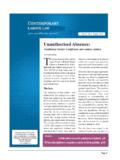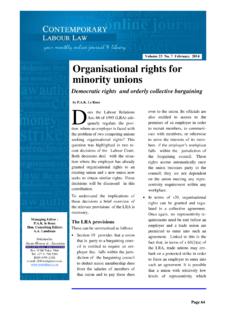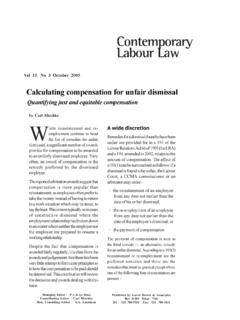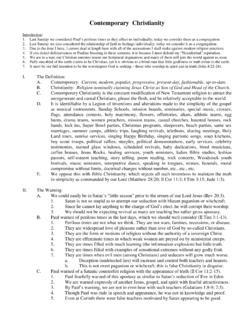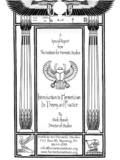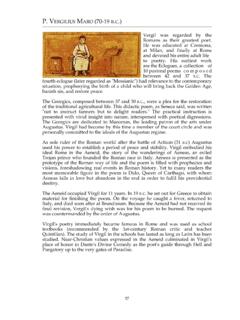Transcription of Contemporary Labour Law - workplace.co.za
1 Editor : P A K Le RouxContributing Editor : Carl MischkePublished by Gavin Brown & AssociatesBox 31380 Tokai 7966 Tel : 021 788-5560 Fax: 021 788-1811 Vol 14 No 8 March 2005 Hon. Consulting Editor : happy workplaces may beall the same, every unhappyworkplace is unhappy in its ownway to paraphrase a famous are countless reasons for unhappinessin a workplace, ranging from frustration,boredom or perceived lack of recognition,serious breakdowns in interpersonalrelationships between employees andmanagers may have devastating effects notonly on the morale of the employeesconcerned, but on the atmosphere andproductivity of the workplace as a , not all employees are the sameand individual personality traits may rangefrom the idiosyncratic, the eccentric, and theunmanageable.
2 In some instances, anemployee may simply be incompatible withother employees, with the reigning corporateculture or managerial styles and approaches,especially when new managers have beenappointed or employees have shifted fromone position to another and now findthemselves working with new colleagues andunder the watchful eye of a differentmanager. This is the essence ofincompatibility: that an employee is unableto work harmoniously with fellow workersor managers or that the employee does not fit in with the corporate line of decisions, going back to IndustrialCourt decisions and more recent arbitrationawards, have made it clear thatincompatibility may, under certaincircumstances, be a ground for given the approach of the LabourRelations Act 66 of 1995 (the LRA) inrespect of dismissal, most notably itslimitation of grounds of dismissal tomisconduct, incapacity and operationalrequirements in section 188, the thorny issuearises as to whether incompatibilityconstitutes incapacity on the part of theemployee or a reason relating to theemployer s operational requirements.
3 Isincompatibility something related to theIncompatibility as a ground for dismissalDifficult employees, eccentrics and the employer s right toharmonious working relationshipsby Carl MischkeTermination of fixed term contracts before expiry. p77 ContemporaryLabour LawPage 72 Contemporary Labour Law Vol 14 No 8 March 2005employee and the employee s ability to do the work,or is it the employer s right to relatively peacefulworking relationships that justify the dismissal?EccentricitySome employees are downright eccentric in theirbehaviour. The less-eccentric employees (or those whosimply succeed in covering up their own idiosyncrasiesmore effectively) may complain, gossip or even refuseto work with an employee or even a manager whomarches to the beat of a completely different drum.
4 InJoslin v Olivetti Systems & Networks Africa(Pty) Ltd (1993) 14 ILJ 227 (IC) managementstepped in because the employee had what wasdescribed as a credibility problem . The employeecarried up to 36 pens in his shirt pocket and sometimescarried a camera around his neck, he sometimes worea cricket cap at work and he used a photocopier topromote a certain political point of view. Complaintsstreamed in, ranging from views that the employee (asenior executive) was making himself the object ofridicule, even attracting terms such as lunatic . Theissue was, according to the employer, not with theemployee s performance of his job but the fact thatthe employee was creating a negative impressionamongst co-workers and was perceived to be actingagainst the best interests of the Industrial Court took the view that odd or eccentricemployee (even in a senior manager) cannot in itselfconstitute a ground for dismissal mild or harmlesseccentricity should be distinguished from extremeforms of unacceptable examples of the latter the Industrial Court mentionedsituations where the employee arrives for work in abathing costume or some other outrageous outfit, ifthe manager receives clients or co-workers whilestanding on his head.
5 Turning cartwheels in the passageoutside the office, according to the Industrial Courtwould also justify a conclusion that dismissal wasappropriate. The Court held that the employee s oddbehaviour amounted to nothing more than a mild formof exhibitionism and the employee was the Industrial Court s view it appears to be a matterof degree but the line between behaviour that is merelyeccentric and destructive incompatibility is at best ablurred one: Dismissal may be appropriate only where theemployee s eccentric behaviour is of such agross nature that it causes consternation anddisruption in the work-place, and then onlyafter he or she has been properly counselled orwarned. A manager should not indulge inwhimsical conduct which may impair thedignity of his office or cause the employerembarrassment.
6 On the other hand a managerwho prefers to wear a black sock on one footand a white sock on the other may be regardedas being eccentric within the limits of tolerableconduct. In other words eccentricity, likemisconduct generally, has to be sufficientlyserious to warrant dismissal. (at 213)Operational requirementsAs old as it may be, the Industrial Court s decision inWright v St Mary s Hospital (1992) 13 ILJ 987(IC) still sets out a number of important principles, notthe least being a focus on underlying causes of the Industrial Court, dismissal for incompatibilityfell within the ambit of the operational that point in time, emphasis fell on the employer sright to insist on reasonably harmonious interpersonalrelationships in the organisation, affirming the earlierview expressed by the Court that the employer wouldbe entitled to remove an employee from the workplaceif the employee s presence or actions gives rise todisharmony (Erasmus v BB Bread Ltd (1987) 8 ILJ 537 (IC)).
7 Another facet of this case which remains of someimportance is the fact that it relates to managerialapproaches and interactions. The employer smanagement and executive committee thought thatthe employee was impatient and that he could not handledifference of opinion diplomatically . Allegationsagainst the employee included that he encouragedsubordinate employees (nurses) to undermine theauthority of their superior (the matron) and that heintervened in the work of others. He allegedlymanipulated and incited other doctors against the boardand his actions were seen as contradicting the policiesand wishes of the board. The employee had lost hiscool at a board meeting, banging his fist on the tableand raising his allegations were that he had criticised thehospital and had written letters to the general public Page 73denigrating the hospital and even that his wife hadmeddled in the nursing doubt, the Court held, the employee could and shouldhave been more diplomatic and his excessiveenthusiasm at times overrode discretion, but in thecontext of the strained relationships which haddeveloped, every perceived slight resulted in aconsiderable overreaction.
8 The root cause of theconflict was the employee s vision for the hospital: theemployee saw it as his mission in life to serve thehospital and he wanted to create a hospital that wouldmean all things to the community it served and fulfilthe needs of the community. It is also worth notingthat confusion of functions and roles aggravated theconflict: the roles of the medical superintendent, thematron and the administrative officer were not for incompatibility, the Court held, would onlybe justified if there is a irremediable breakdown inworking relationships. From a procedural perspective,the Industrial Court emphasised the need for remedialaction to the perceived incompatibility and, if theemployee is found to have been responsible for thestrained relationships, that he be given a fair opportunityto remove the cause for disharmony.
9 On the facts ofthe case the Industrial Court found that reinstatementwould a fair managementThe introduction of a new management team or evena new senior manager in a specific section of theorganisation may lead to increased conflict. Lubke vProtective Packaging (Pty) Ltd (1994) 15 ILJ 422(IC) is a case in point. The employer appointed a newmanaging director and, as the proverbial new broom,the director made sweeping reforms in an attempt toreinvigorate the company. It was not the changes shemade, however, but the manner in which the changeswere made and the tempo of change that causedannoyance amongst the subordinates who complainedthat the new managing director was out to change thecorporate culture. As is almost invariably the case inconflict situations such as these, the managing directorwas told that she lacked interpersonal skills herperformance of her work was not at issue and theemployer at no stage claimed that her performancewas poor.
10 On the contrary, the employer had, in theproceedings before the Industrial Court, nothing butpraise for the work she had done in redefining internalfunctions and operations. Because of the director sso-called dictatorial style and approach, one employeeallegedly resigned and others threatened to do so. TheIndustrial Court had little sympathy for these disgruntledemployees: In any event, they should have known that it isa fact of life that new brooms do sweep personnel who fall under the supervisionof a new executive appointee, such as a newmanaging director, should learn to live with,and to adapt themselves to changes and newwork patterns, instead of crying foul play, simplybecause the bristles of the new broom happento be hard and irksome. Where a managingdirector has been selected for appointmentfollowing exhaustive screening, then it ismanifestly unfair to terminate the employmentcontract, after a short period of time, simplybecause some employees cannot come to termswith the new regime and show signs ofrebellion.


